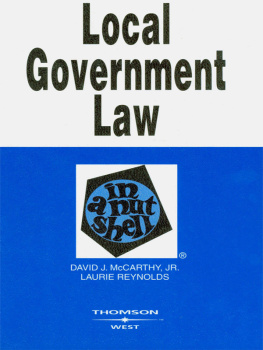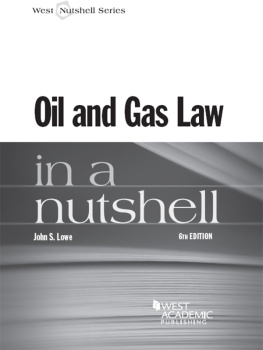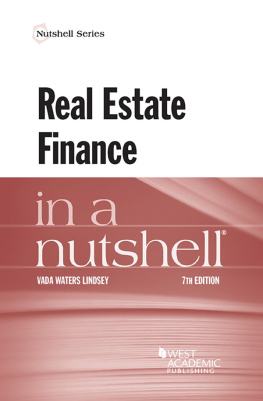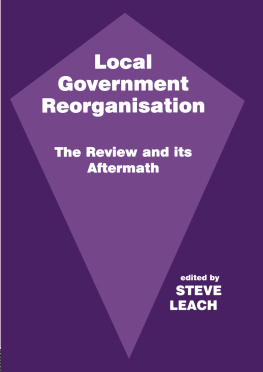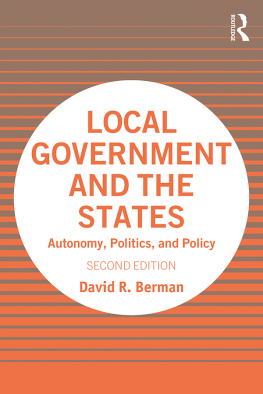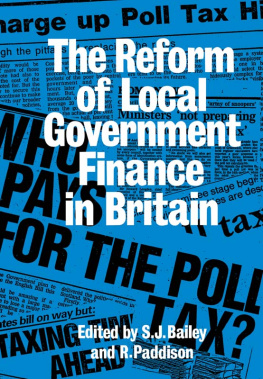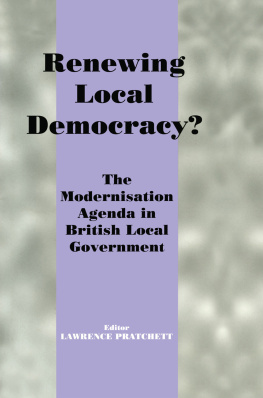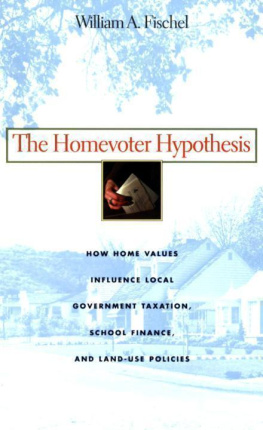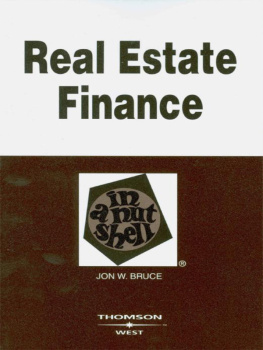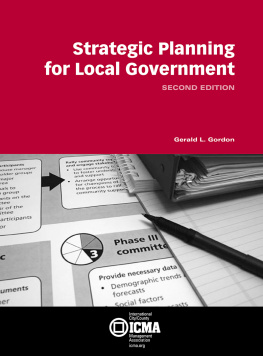Landmarks
Page list

WESTS LAW SCHOOL
ADVISORY BOARD
_________
JESSE H. CHOPER
Professor of Law,
University of California, Berkeley
DAVID P. CURRIE
Professor of Law, University of Chicago
YALE KAMISAR
Professor of Law, University of Michigan
Professor of Law, University of San Diego
MARY KAY KANE
Chancellor, Dean and Distinguished Professor of Law,
University of California,
Hastings College of the Law
WAYNE R. LaFAVE
Professor of Law, University of Illinois
ARTHUR R. MILLER
Professor of Law, Harvard University
GRANT S. NELSON
Professor of Law, University of California, Los Angeles
JAMES J. WHITE
Professor of Law, University of Michigan
I
LOCAL GOVERNMENT LAW
IN A NUTSHELL
FIFTH EDITION
By
DAVID J. McCARTHY, Jr.
Dean Emeritus & Carmack Waterhouse Professor of
State and Local Government Law, Emeritus
Georgetown University Law Center
LAURIE REYNOLDS
Professor of Law
University of Illinois College of Law

Mat #40064727
II
West, a Thomson business, has created this publication to provide you with accurate and authoritative information concerning the subject matter covered. However, this publication was not necessarily prepared by persons licensed to practice law in a particular jurisdiction. West is not engaged in rendering legal or other professional advice, and this publication is not a substitute for the advice of an attorney. If you require legal or other expert advice, you should seek the services of a competent attorney or other professional.
Nutshell Series, In a Nutshell, the Nutshell Logo and West Group are trademarks registered in the U.S. Patent and Trademark Office.
COPYRIGHT 1975, 1983, 1990, 1995 WEST PUBLISHING CO.
COPYRIGHT 2003 By West, a Thomson business
610 Opperman Drive
P.O. Box 64526
St. Paul, MN 551640526
18003289352
Printed in the United States of America
ISBN 0314264892

III
TO MARY E. McCARTHY
D.J.M.
TO JOE, KATY, AND DAVID
L.R.
*
V
PREFACE
_________
This text will aid students who seek to learn Local Government Law. We hope that it will also assist practicing attorneys who seek an overview of all or part of the subject matter. The relationships among local governments, their citizens, their states and the federal government are so pervasive that choices of emphasis must of necessity be made in a text of this size. Because Local Government Law tends to overlap several other law school courses, the choice in this text was to address at least as many areas as could accurately convey the scope of these relationships and to treat more extensively areas, such as taxation and borrowing, that are not likely to be pursued in such detail in the core courses common to all law school curricula.
The vast scope of the subject inevitably means that individual authors and editors will approach it with differing views of the most interesting and instructive theme and focus. Our choice has been the central theme of delegated power and the limitations imposed on its exercise by law and challenge, the latter because it serves significantly, as intended, to restrain the exercise of governing power. The setting is, perhaps, more practical than theoretical.
Occasionally, throughout the text, comments and queries will attempt to provoke reader reaction (agreement or disagreement) to the status or trend of particular legal principles and of local government VI policies. Frequent illustrations, many of which have been drawn from actual cases, will be used to assist in understanding the text.
While many cases, articles, books and casebooks were consulted in the preparation of this and preceding editions, we are especially grateful for the assistance provided by the writings of Chester Antieau, Richard Briffault, David Callies, Jefferson Fordham, Robert Freilich, Gerald Frug, M. David Gelfand, Clayton Gillette, Jerome Hellerstein, Walter Hellerstein, Harold Hovey, George Lefcoe, Michael Libonati, Daniel Mandelker, Frank Michelman, Dawn Clark Netsch, Laura Oren, Osbourne Reynolds, Peter Salsich, Terence Sandalow, Sho Sato, William Valente, Arvo Van Alstyne, Judith Wegner, and Robert Williams.
For past editions, Professor McCarthy has expressed his gratitude to several people: to Georgetowns very supportive Dean, Judith Areen; to his student research assistants, Kathryn Kovacs (JD 1995) and David Angeli (JD 1997); and to Georgetowns Office of Administration personnel for their indispensable assistance. Professor Reynolds thanks Jennifer Chavez for her outstanding research and Patricia Estergard for tireless secretarial assistance.
DAVID J. MCCARTHY, JR.
LAURIE REYNOLDS
XXI
LOCAL GOVERNMENT LAW
IN A NUTSHELL
FIFTH EDITION
*
VII
OUTLINE
___________
VIII
IX
X
XI
XII
XIII
XIV
XV
XVI
XVII
XVIII
XIX
*
CHAPTER I
LOCAL GOVERNING POWERGENERAL ASPECTS, LIMITATIONS, RESOLUTION OF POWER CONFLICTS AND CHALLENGES
A. INTRODUCTION
1. Basic Questions and Terms
Broadly considered, the study of Local Government Law is the study of local governing powers exercised by entities subsidiary and largely subordinate to the state. A partial understanding of state government and of the roles of governments in the federal system necessarily accompanies the study. When government at any level plans to act, a basic question is whether the proposed activity is an appropriate one for government. Should government get into the business of owning and operating airports?
Since all government is restricted within limits constitutionally structured by the people, the next question may be whether the government entity can act as planned. Can government get into the business of owning and operating an airport?
When the prospective actor is a government of delegated authority, the question of its ability to act would perhaps be phrased, Does this city, Bigville, possess the authority to own and operate this airport?
While legislative and judicial attempts to answer these questions may frequently be characterized as unsatisfactory, resolution of the questions is at the heart of local governance. The decision to what extent the local government either ought to or can initiate activity which might be the subject of private action or government involvement at another level is, in the first instance, committed to the local legislative body. The courts often defer to this decision, especially as to the appropriateness of activity. When a judicial decision of appropriateness is made, it may be expressed in a determination whether the activity serves a public purpose, or serves to protect the public health, safety, morality or general welfare. The expenditure of funds for the purchase and operation of the airport will expedite public travel, will ensure the safety of air traffic operation, will increase local business access to economical commercial routes, will create more jobs, will protect residential areas, and thus will serve a public purpose. Underlying the spoken or unspoken question of appropriateness are basic legislative or judicial views of the importance of centralization or diffusion of power and the consequent protection of individual liberties.

